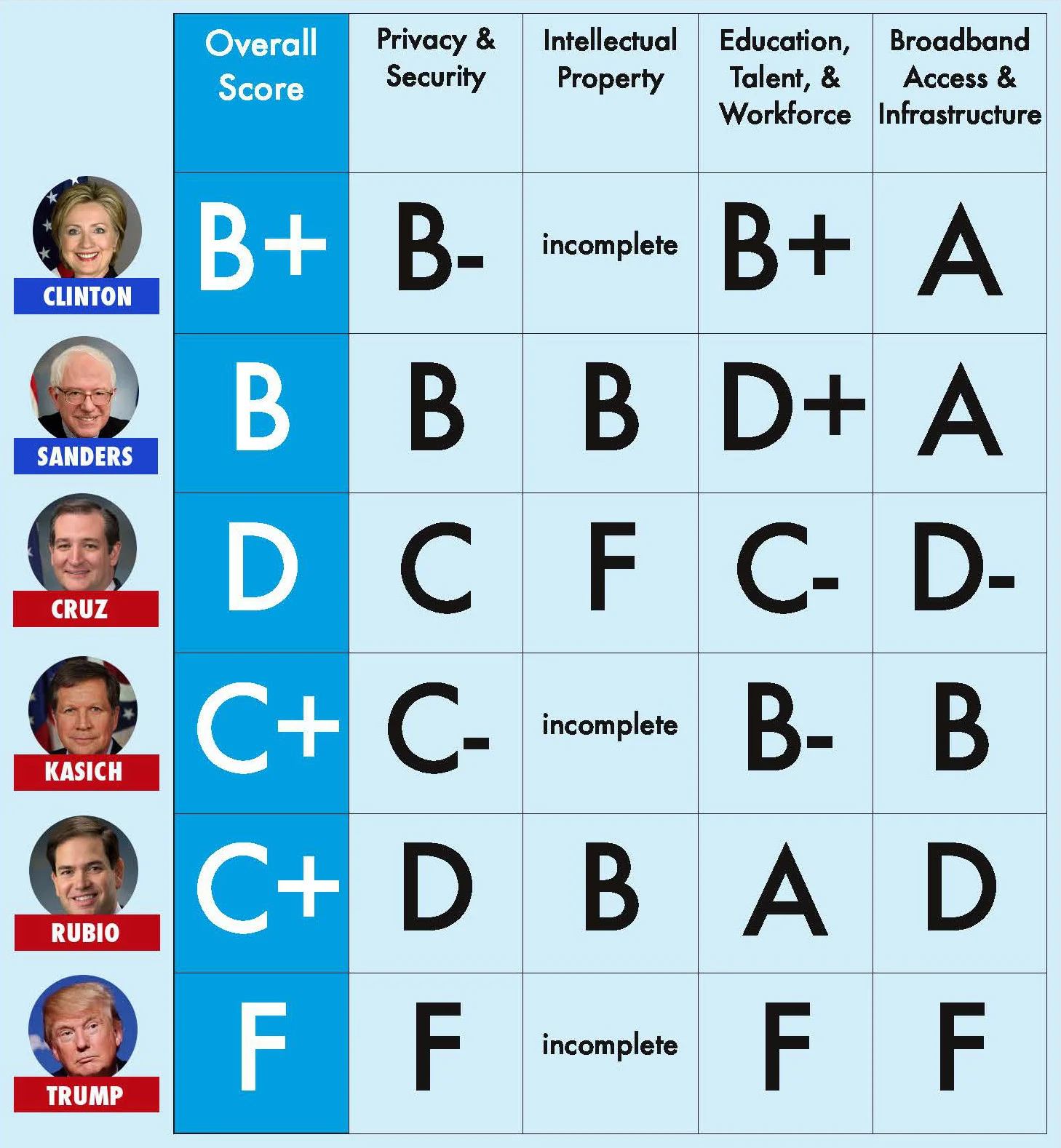The RIAA and its allies in the traditional music industry continue to ramp up their efforts to undo one of the key laws that made the modern internet possible, releasing a letter to Congress yesterday signed by dozens of musicians arguing that the Digital Millennium Copyright Act (DMCA) is somehow ruining the music industry.
Who’s the Candidate for Tech? Let’s Look at the Issues.
Recent headlines from around the country suggest that Silicon Valley has united against Trump...In addition to analyzing what influential venture capitalists and executives have to say about Trump, it’s just as important we take a close look at the issues and positions that impact the industry at large, from the major tech firms headquartered in the Valley to the single-person startups building new technologies and services in cities around the country.
It's Time We Empower Veterans with Entrepreneurial Skills
By the end of the year, over one million veterans will have transitioned from the military to civilian life since 2011, settling into communities across the country and charting new career paths for themselves. For some veterans, pursuing the educational opportunities covered by the GI Bill will be their logical next step.
An Opportunity to Fix Crowdfunding Before It Falters
On May 16, 2016, regulation crowdfunding will go into effect, meaning for the first time ever,anyone can invest in a startup through an online platform. This is big. Until Congress passed the JOBS Act in 2012, buying an equity stake in a company required being fairly wealthy or having a pre-existing relationship with the entrepreneurs raising capital. But the Internet has dramatically changed the way entrepreneurs share their ideas and connect with potential investors. With the JOBS Act, the law finally caught up as well – or it almost did.
Calling All Accelerators: SBA Launches Growth Accelerator Fund Competition
Do you run a growth accelerator, incubator, co-working space, shared maker-space, or other entrepreneurial ecosystem organization? If so, you might be eligible to compete for a $50,000 prize from the government. Last week, the Small Business Administration (SBA) launched its Growth Accelerator Fund Competition for the third year in a row. Each year, the agency awards $50,000 prizes to selected organizations to help cover part of their operating budgets.
Why Startups Need More Unlicensed Spectrum, and How They Can Get It
Startups across the country are building the next generation of Internet applications, connected devices, and innovative services—all of which rely on access to unlicensed spectrum. This week, Engine joined a diverse coalition of 23 organizations and companies in urging President Barack Obama to ensure that enough unlicensed spectrum is made available to meet growing demand.
An Outdated Law Shouldn't Limit Demo Days
The pitch competition has practically become a standard rite of passage for startups, especially early-stage firms seeking investment. Yet, many pitch events may violate decades-old securities law. Congress is now considering legislation to fix this: The HALOS Act. Sponsored by Rep. Steve Chabot (R-OH), this legislation clarifies the rules around pitch competitions, making it easier for startups to pitch their business plans and find potential investors.
One Way Stock Options Are Hurting Businesses – And How to Fix It
Among the many challenges entrepreneurs face in launching and scaling a startup, recruiting talented employees is one of the most difficult. There’s already a shortage of tech workers in this country (there are currently more than 600,000 open computing jobs nationwide, and last year, only 43,000 students graduated with computer science degrees), and it’s even more dire for startups that must compete with some of the most successful companies in the world to recruit these employees.
The Fight Against Stupid Patents
Four Years of the JOBS Act: Examining Its Impact and Looking Forward
April 5, 2016 marked the four year anniversary of the enactment of the Jumpstart Our Business Startups (JOBS) Act. While the statute is still relatively young, we have already begun to see the positive impacts that its provisions have had on startups’ ability to raise capital. It has made going public easier and created new pathways for startups to raise money through Regulation A+ and general solicitation under Regulation D. And with regulation crowdfunding set to finally go live in May, we are hopeful that a vibrant non-accredited investor crowdfunding market will emerge in the near future.
The Tech Community Is Mobilizing Against the Burr-Feinstein Encryption Bill
It is hard to overstate how incredibly dangerous and foolish the Burr-Feinstein “Compliance with Court Orders Act of 2016” draft legislation is and even harder to believe it was coauthored by California’s senior senator, Dianne Feinstein, D-Calif., and Sen. Richard Burr, R-N.C.
Engine Joins Letter Opposing House Rate Regulation Bill
In the year since the Federal Communications Commission (FCC) approved its historic Open Internet Order, net neutrality has faced countless attacks in both the courts and Congress. Once again, the Order and the FCC’s broader authority have come under fire. H.R. 2666, the “No Rate Regulation of Broadband Internet Access Act,” threatens the FCC’s ability to fulfill its congressionally-mandated responsibilities and represents yet another attempt by anti-net neutrality lawmakers to undermine an open Internet.
Momentum in Miami: Lessons from an Emerging Startup Ecosystem
Across the country and far beyond Silicon Valley, new centers of startup activity are on the rise. Among them, Miami, Florida is one of the more exciting and dynamic cities emerging as a hub for startups. Not only are more entrepreneurs calling Miami home, but a real ecosystem is forming, complete with a new co-working and events space in the heart of Miami’s Wynwood district, investor groups with a renewed commitment to South Florida entrepreneurs, and a slew of meet-ups, conferences, and hackathons attracting students, programmers, entrepreneurs, and investors eager to be part of this transformation.
What's Missing in the Conversation about Immigration Reform
Since the earliest days of this election cycle, the 2016 presidential candidates have been sparring about immigrants and immigration reform. Both Democrats and Republicans agree that the country’s immigration policies are among the most important issues the next administration will need to tackle (and hopefully with the support of Congress). Yet, as enormous and all-encompassing as our country’s immigration problems are, only a narrow portion of them have been discussed by the candidates.
The SEC could change the requirements for investing in startups, and that’s not good
As strange as it may seem, only a small percentage of Americans can legally invest in most startups today. Under long-standing rules governing who qualifies as a so-called “accredited investor,” only quite wealthy individuals (those make at least $200,000 in annual income or have $1 million in assets, excluding their home) can buy shares in a fast-growing, privately held company.
The VENUE Act: It's Time to Get Patent Trolls out of East Texas
This week, Senators Flake, Gardner, and Lee introduced a piece of legislation targeting one of the most egregious—and, frankly, ridiculous—problems with our current patent system. Specifically, the Venue Equity and Non-Uniformity Elimination (VENUE) Act would get patent cases out of the Eastern District of Texas, where patent trolls most commonly file their specious lawsuits. Together with the comprehensive reform legislation found in the PATENT Act, this bill would help put an end to a dangerous patent troll problem that continues to prey on this country’s startups and innovators.
We Graded the 2016 Candidates on Tech and Startups: Here's How They Ranked
It’s safe to say that 2016 election cycle has been like no other and, frankly, disturbing for a number of reasons. We are particularly concerned that the high drama has distracted from the important work of a campaign season—the public debate over the important issues of our time. Nowhere has this debate been more absent than in the tech and startup community, which is ironic, given the importance of tech and startups to our economy.
We Need More Spectrum
As the world becomes increasingly mobile, it is essential that U.S. policymakers devise a strategy to meet the growing demand for wireless connectivity. Yesterday, the Senate Commerce Committee passed the MOBILE NOW Act, which aims to free up additional spectrum for commercial use and improve mobile infrastructure. The bill represents a significant step towards transforming our mobile future and encouraging technological innovation. The full Senate should take up and pass the bill at the earliest opportunity.
Google Fiber Launches New Public-Private Partnerships in Huntsville and San Francisco
Google Fiber announced this week that it is adding both San Francisco, CA and Huntsville, AL to the growing list of cities where it provides gigabit service. This is great news for startups and aspiring entrepreneurs in the two cities, who will have improved access to ultra high-speed service (100x faster than most current broadband providers) and increased competition among providers. But this week’s announcements are especially noteworthy because Google Fiber will be deviating from its typical build out approach with these two new expansions.
Diversifying Tech Caucus Hosts First 2016 Briefing on African Americans in Tech
The Diversifying Tech Caucus, the bipartisan, bicameral caucus that Engine helped establish last year, held its first briefing of 2016 earlier this week. The Capitol room was packed with over 70 congressional staffers who heard from a panel of tech workers, leaders, and entrepreneurs about African American participation in the tech workforce. The numbers aren't great, with African Americans making up just 6 percent of STEM workers, a dismal 2 percent of employees at major Silicon Valley firms, and an even smaller percentage of venture-backed startups. Yet, many efforts, from private industry as well as non-profit organizations, are underway to the bolster the participation and leadership of blacks in tech.


























